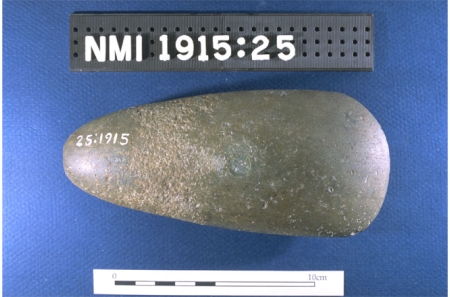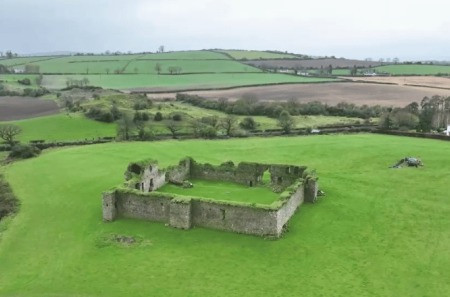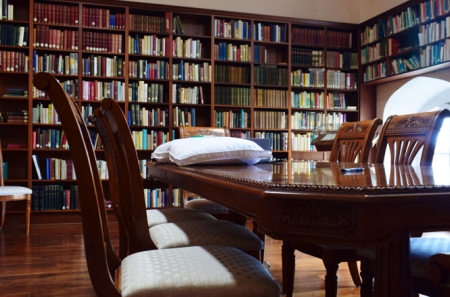
Charlemont Grant Awards Ceremony 2016
25 February 2016Mary E. Daly, President of the Academy presented the 26 2016 Charlemont scholars with their certificates and congratulated them on their success.
Professor Daly noted the importance of the award and the diversity of disciplines awarded. The Charlemont Grants have a very special place in the intellectual life of the Royal Irish Academy, because they are awarded to researchers in the early stages of their careers. Charlemont grantees are drawn from the humanities, social sciences and natural sciences, the Charlemont grants do not distinguish between discipline or geography, the most important criteria in the awarding of a Charlemont grant is excellence because outstanding research transcends both disciplinary and geographical boundaries.
Peter Kennedy, International Affairs Secretary of the Academy highlighted the importance of travel and the cross pollination of ideas for research. The Charlemont Scholars are Ireland’s scientific and cultural emissaries of the twenty-first century. Through their experiences, sharing what they know and bringing back new ideas, we look forward to their enriching academic life in Ireland. Kennedy announced the scholars, their institutions and the destinations they will be travelling to. The diversity of locations included London, Lisbon, New York, Tokyo and Taiwan.
Dr. Diarmuid Torney from Dublin City University, 2015 Charlemont Scholar, recounted how this grant has been beneficial for his research and career. This has included publication of his book 'European Climate Leadership in Question: Policies toward China and India', by MIT Press in September 2015 and regular features in the Irish Times.
Named in honour of the Academy’s first President, and notable Grand Tourist, James Caulfeild, the 1st Earl of Charlemont (1728–99), this scheme is the successor to the acclaimed Mobility Grants, which was established by the Academy in 2007. Building on the success of that scheme, the Charlemont Grants are unique in offering funding for short international research trips, to support primary research in any area.
Since its inception the scheme has funded 155 projects, across the sciences, humanities and social sciences. It has funded visits to over fifty countries, with a total fund disbursed to date of over €250,000. The Royal Irish Academy Charlemont grants are awarded to scholars of the sciences and humanities and social sciences each year. For further information please see here.
Guests at the ceremony included members of the Irish higher education system, funding agencies, past Charlemont scholars and friends and family of the current scholars.
If you would like to receive future information about the 2017 call for grants please email grants@ria.ie
|
Humanities: |
|
||
|
Dr Ailise Bulfin |
TCD |
Literature and propaganda: An investigation of the impact of invasion scare fiction on pre-World War I British society |
English studies, history |
|
Dr Alexander Dukalskis |
UCD |
Transition(s) in Burma/Myanmar: Emerging from authoritarianism and armed conflict |
Political science |
|
Dr Bronagh McShane |
NUIG |
Irish women religious in exile during the early modern period: a case study of the Irish Dominican convent of Bom Sucesso, Lisbon |
History |
|
Dr Caroline Rawdon |
UCD |
An investigation of the effectiveness of emotion recognition training to reduce symptoms of social anxiety in adolescence |
Psychology, cognitive bias modification, social anxiety |
|
Dr David Heffernan |
Independent |
The ‘Composition for Cess’ controversy and the position of the Old English in Elizabethan Ireland, c. 1575-1584 |
History |
|
Dr Denis Casey |
MU |
An edition and translation of Annála Gearra as Proibhinse Ard Macha (British Library, additional MS 30512) |
Medieval Irish history |
|
Dr Grainne McEvoy |
TCD |
Justice and order: American Catholic social thought and immigration in the 20th Century |
American history |
|
|
TCD |
Debating Chinese child slavery: child protection in 1930s Shanghai |
History |
|
Dr Jennifer Yeager |
WIT |
Memory and the Magdalenes: An examination of the role of professionals in shaping public memory |
Social sciences, psychology |
|
Dr Julie Bates |
TCD |
Louise Bourgeois’s fabric works: the passage of time on a personal scale |
Phenomenology of time, material culture, visual art, literature. |
|
Dr Lindsay Reid |
NUIG |
Go, Little Ring: Graven posies and subjective objects in early Modern England |
English literature (early modern) |
|
Dr Marek Martyniszyn |
QUB |
From opposition into the Vanguard: an investigation into recent changes in the Japanese approach to extraterritoriality in competition law enforcement |
Competition law |
|
Dr Mercedes Peñalba-Sotorrío |
UCD |
The Axis Brotherhood: The role of propaganda in Spanish policy during World War II |
Modern European history |
|
Dr Siobhan Howard |
Mary Immaculate College |
Psychophysiological stress reactions in military veterans: Examining the moderating role of stressor context and Type D personality |
Psychology |
|
Dr Triona O’Hanlon |
QUB |
Reception of Thomas Moore in Paris |
Musicology, bibliography, literature |
|
Sciences: |
|
||
|
Dr Emily Porter |
NUIG |
Standardised calibration and validation techniques for the dielectric measurements of biological tissues |
Biomedical engineering |
|
Dr Erin Jo Tiedeken |
AIT |
Applying novel disinfection technologies to control harmful pollinator pathogens and parasites |
Parasitology: emerging infectious bee diseases
|
|
Dr Evelyn Keaveney |
QUB |
Production rate, carbon source and burial in sediments of a hyper-eutrophic lake – Rostherne Mere |
Biogeochemistry: carbon cycling, limnology, climate, isotope, radiocarbon
|
|
Dr Francesc Font |
UL |
Phase change at the nanoscale: Exploring the limits of continuum theory |
Nanoscience, applied mathematics
|
|
Dr Jim Johnson |
UCD |
Response of soil solution acidity in European forests to reductions in air pollution |
Environmental science, forest ecology |
|
Dr Justin King |
UCD |
Investigation of model order reduction techniques on state-of-the-art polyharmonic distortion models |
Radio frequency and microwave engineering |
|
Dr Kevin Burke |
UL |
Robust multi-parameter regression models for clustered survival data |
Survival analysis (statistics) |
|
Dr Linh Truong-Hong |
UCD |
Rapid laser scanning based road network assessment |
Civil engineering |
|
Dr Luke Prendergast |
UCD |
Auto-calibrating dynamic soil-pile interaction model for offshore wind turbine analysis |
Structural-geotechnical engineering |
|
Dr Mingjia Yan |
UCD |
Life cycle assessment of dairy processing |
Environmental science |
|
Dr Shane Hegarty |
UCC |
Smad-interacting protein-1 regulation of nigrostriatal pathway development. |
Neuroscience |



